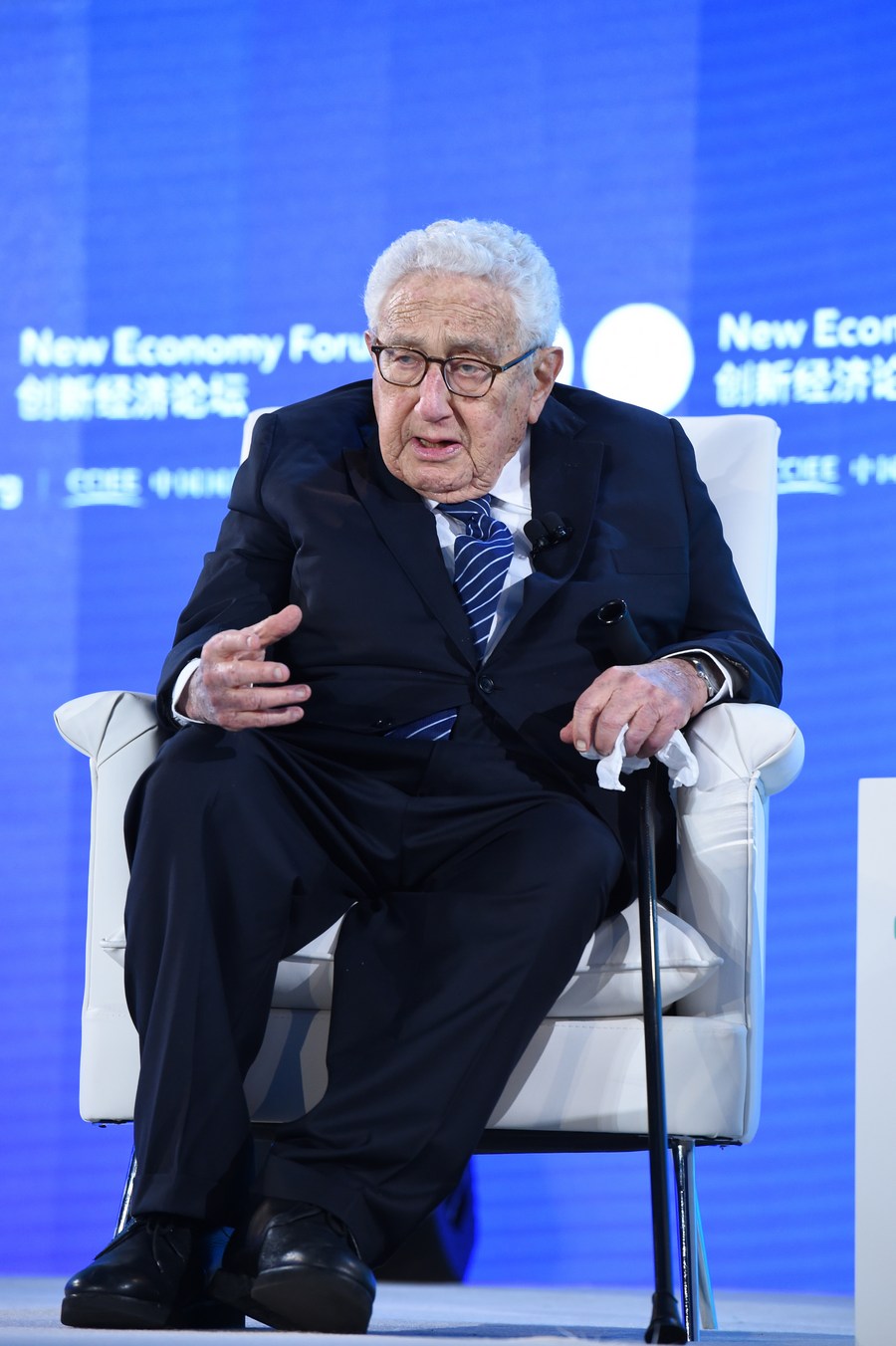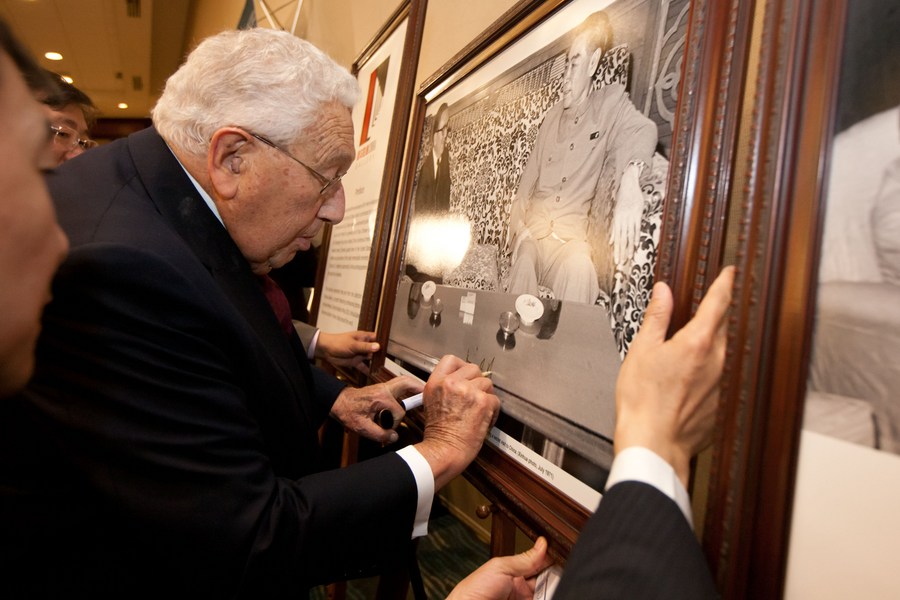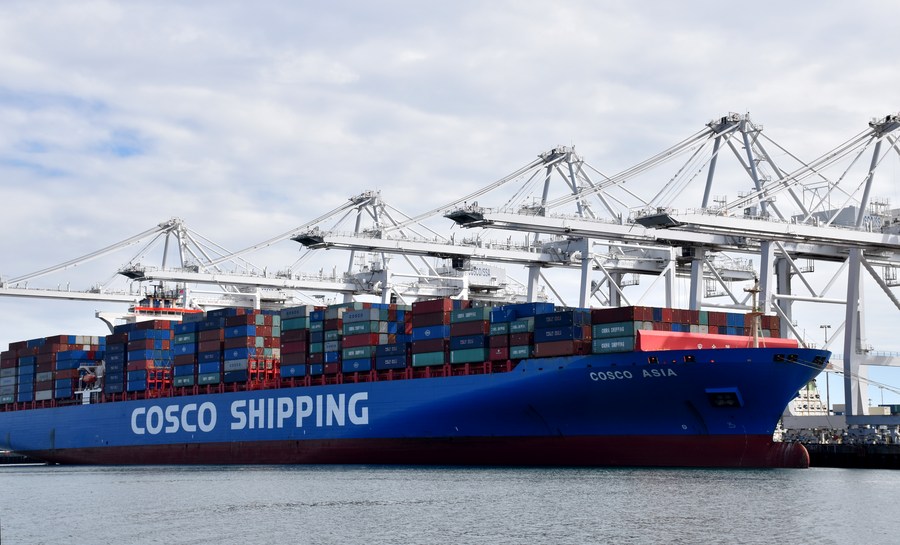 Henry Kissinger, former U.S. Secretary of State, speaks at the New Economy Forum in Beijing, capital of China, Nov. 21, 2019. (Xinhua/Dai Tianfang)
Henry Kissinger, former U.S. Secretary of State, speaks at the New Economy Forum in Beijing, capital of China, Nov. 21, 2019. (Xinhua/Dai Tianfang)
Political leaders in Washington should recognize the trend of the times, pick up the extraordinary courage of their predecessors, and carry forward their political wisdom and foresight to work with their Chinese counterparts and navigate the two countries' relations through the current rough waters.
by Xinhua writer Wang Lei
BEIJING, July 9 (Xinhua) -- Fifty years ago, then U.S. National Security Advisor Henry Kissinger undertook a secret mission to Beijing, which helped lay the groundwork for U.S. President Richard Nixon's ice-breaking China visit and the eventual normalization of relations between the two long-estranged countries.
Fifty years later, the relationship between the world's top two economies now stands at another critical juncture because of an increasingly agitated Washington.
For the common interests of both countries and the wider global community, it is imperative to look back at history and digest the important revelations of the world-changing move half a century ago and the development of China-U.S. ties in the following decades.
 Henry Kissinger signs autograph on a 1971 photo capturing a scene from his secret trip to China, during a photo exhibition organized by Xinhua News Agency in Washington, the United States, on June 6, 2011. (Xinhua/Zhu Wei)
Henry Kissinger signs autograph on a 1971 photo capturing a scene from his secret trip to China, during a photo exhibition organized by Xinhua News Agency in Washington, the United States, on June 6, 2011. (Xinhua/Zhu Wei)
Kissinger's trip to China was code-named "Marco Polo," meaning the mission was as unknown and unpredictable as the Italian merchant and explorer's adventure to the mysterious oriental land in the 13th century. Before the visit, Beijing and Washington had neither diplomatic ties nor economic interactions with each other, while a "Red China" scare and anti-communism sentiments dominated America's politics.
When then Chinese and U.S. leaders chose to break the barriers and reopen the door for exchanges at the height of the Cold War, they looked farther than their living time and thought with a global vision.
As Kissinger, who later served as U.S. secretary of state, observed in his book "On China," when China and the United States started to restore relations, the most significant contribution made by the leaders of that time was their willingness to raise their sight beyond the immediate issues of the day.
In the Cold War era, there were indeed geopolitical and strategic considerations in the rapprochement of China-U.S. ties, but the development of China-U.S. relations also showed that China and the United States, with quite different ideologies, cultures and political systems, are capable of living together in peace and engaging in win-win cooperation as long as they have the will to act in the shared interests of both countries and their people.
The historic achievements the two countries have scored during the past five decades are convincing evidence that their win-win cooperation has not only brought huge benefits to both sides but also contributed significantly to global peace, stability and prosperity.
From an almost negligible 2.5 billion U.S. dollars in the late 1970s, their bilateral trade soared incredibly to roughly 600 billion dollars last year in spite of the COVID-19 pandemic. Today, the combined gross domestic product of the two major world players accounts for over 40 percent of the global economy.
 Containers of China COSCO Shipping Corporation Limited are seen at the Port of Long Beach in Los Angeles County, the United States, Feb. 27, 2019. (Xinhua/Li Ying)
Containers of China COSCO Shipping Corporation Limited are seen at the Port of Long Beach in Los Angeles County, the United States, Feb. 27, 2019. (Xinhua/Li Ying)
China and the United States have also jointly dealt with various pressing global challenges, such as the 2008 global financial crisis, the Ebola outbreak in Africa, climate change and terrorism.
However, it is worrying to see that in recent years the zero-sum Cold War thinking has begun to prevail in Washington and a bunch of Washington politicians are poisoning China-U.S. relations.
Washington's paranoia to paint China as a grave threat has already seriously obstructed the two countries' mutually beneficial cooperation, and harmed what many deem as the most important bilateral relationship in the world. In the meantime, mounting tensions in China-U.S. relations are also detrimental to the much-needed global cooperation in the face of an array of global challenges.
While it is necessary for U.S. policymakers to revisit the political wisdom and courage of their predecessors like Kissinger and Nixon at this critical moment, they should stay clear of the trap of misreading the big picture.
There is already talk in Washington that the United States should lure Moscow to counter Beijing, or at least try to drive a wedge between China and Russia. Such a stratagem, simply a rigid interpretation of the Cold War triangular diplomacy without taking into consideration the sea-change of the global landscape, will go nowhere.
It is indeed a different age now. Ideological confrontation and you-win-I-lose geopolitical struggle belong to yesterday.
In an era of growing interdependence and rising global challenges, humanity has no future but a shared one. Countries worldwide, particularly major ones like China and the United States, have no other viable option than to work together for the common good.
If Washington's decision-makers continue to take China-U.S. relations as a zero-sum game in which they must win by taking China down, they will lead the United States further astray at the expense of both countries' interests as well as world peace and stability.
In late April, Kissinger warned at a forum that strains with China are "the biggest problem for America, the biggest problem for the world," as there is a potential for "a kind of Cold War" to develop between the two heavyweights.
Political leaders in Washington should recognize the trend of the times, pick up the extraordinary courage of their predecessors, and carry forward their political wisdom and foresight to work with their Chinese counterparts and navigate the two countries' relations through the current rough waters. ■




